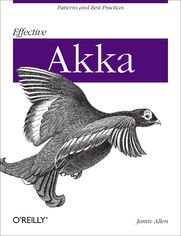Effective Akka. Patterns and Best Practices - Helion

ISBN: 978-14-493-6003-0
stron: 74, Format: ebook
Data wydania: 2013-08-15
Ksi─Ögarnia: Helion
Cena ksi─ů┼╝ki: 50,91 z┼é (poprzednio: 59,89 z┼é)
Oszczędzasz: 15% (-8,98 zł)
Avoid common mistakes when building distributed, asynchronous, high-performance software with the Akka toolkit and runtime. With this concise guide, author Jamie Allen provides a collection of best practices based on several years of using the actor model. The book also includes examples of actor application types and two primary patterns of actor usage, the Extra Pattern and Cameo Pattern.
Allen, the Director of Consulting for Typesafe—creator of Akka and the Scala programming language—examines actors with a banking-service use case throughout the book, using examples shown in Akka and Scala. If you have any experience with Akka, this guide is essential.
- Delve into domain-driven and work-distribution actor applications
- Understand why it’s important to have actors do only one job
- Avoid thread blocking by allowing logic to be delegated to a Future
- Model interactions as simply as possible to avoid premature optimization
- Create well-defined interactions, and know exactly what failures can occur
- Learn why you should never treat actors as you would an ordinary class
- Keep track of what goes on in production by monitoring everything
- Tune Akka applications with the Typesafe Console
Osoby które kupowały "Effective Akka. Patterns and Best Practices", wybierały także:
- Architektura ewolucyjna. Projektowanie oprogramowania i wsparcie zmian 57,74 zł, (17,90 zł -69%)
- F# 4.0 dla zaawansowanych. Wydanie IV 96,45 zł, (29,90 zł -69%)
- Systemy reaktywne. Wzorce projektowe i ich stosowanie 65,31 zł, (20,90 zł -68%)
- Jak sta─ç si─Ö lepszym programist─ů. Przewodnik 55,94 z┼é, (17,90 z┼é -68%)
- Scratch. Komiksowa przygoda z programowaniem 36,06 zł, (11,90 zł -67%)
Spis tre┼Ťci
Effective Akka. Patterns and Best Practices eBook -- spis tre┼Ťci
- Effective Akka
- Preface
- Who This Book Is For
- What Problems Are We Solving with Akka?
- Distributed
- Asynchronous
- High Performance
- Reactive Applications
- Use Case for This Book: Banking Service for Account Data
- Conventions Used in This Book
- Using Code Examples
- Safari Books Online
- How to Contact Us
- Acknowledgments
- 1. Actor Application Types
- Domain-driven
- Domain-driven Messages Are Facts
- Work Distribution
- Routers and Routees
- Random
- Round robin
- Smallest mailbox
- Broadcast
- ScatterGatherFirstCompletedOf
- Consistent hash routing
- BalancingDispatcher Will Be Deprecated Soon!
- Work Distribution Messages Are Commands
- Routers and Routees
- Domain-driven
- 2. Patterns of Actor Usage
- The Extra Pattern
- The Problem
- Avoiding Ask
- Capturing Context
- Sending Yourself a Timeout Message
- Why not use a promise?
- How to test this logic
- The Cameo Pattern
- The Companion Object Factory Method
- How to Test This Logic
- The Extra Pattern
- 3. Best Practices
- Actors Should Do Only One Thing
- Single Responsibility Principle
- Create Specific Supervisors
- Keep the Error Kernel Simple
- Failure Zones
- Avoid Blocking
- Futures Delegation Example
- Java futures are blocking!
- Pre-defining Parallel Futures
- Parallel Futures with the zip() Method
- Sequential Futures
- Callbacks versus Monadic Handling
- Futures and ExecutionContext
- Push, Dont Pull
- When You Must Block
- Managed Blocking in Scala
- Futures Delegation Example
- Avoid Premature Optimization
- Start Simple
- Deterministic
- Declarative
- Immutable
- Functional
- Layer in Complexity via Indeterminism
- Optimize with Mutability
- Add mutability with compare and swap (CAS)
- Compose CAS with Software Transactional Memory
- Add locks as a last resort
- Prepare for Race Conditions
- Avoid coding in a way where timing matters
- Tell, dont ask
- Start Simple
- Be Explicit
- Name Actors and ActorSystem Instances
- Create Specialized Messages
- Create Specialized Exceptions
- Beware the Thundering Herd
- Dampen message overload
- Use circuit breakers for failure overload
- Dont Expose Actors
- Avoid Using this
- The Companion Object Factory Method
- Never Use Direct References
- Dont Close Over Variables
- Use Immutable Messages with Immutable Data
- Help Yourself in Production
- Make Debugging Easier
- Add Metrics
- Externalize Business Logic
- Use Semantically Useful Logging
- Aggregate Your Logs with a Tool Like Flume
- Use Unique IDs for Messages
- Tune Akka Applications with the Typesafe Console
- Fixing Starvation
- How do you fix it?
- Does PinnedDispatcher help?
- Failure zones
- Routers
- Sizing Dispatchers
- The Parallelism-Factor Setting
- Actor Mailbox Size
- Throughput Setting
- Edge Cases
- Fixing Starvation
- Actors Should Do Only One Thing
- About the Author
- Colophon
- Copyright





